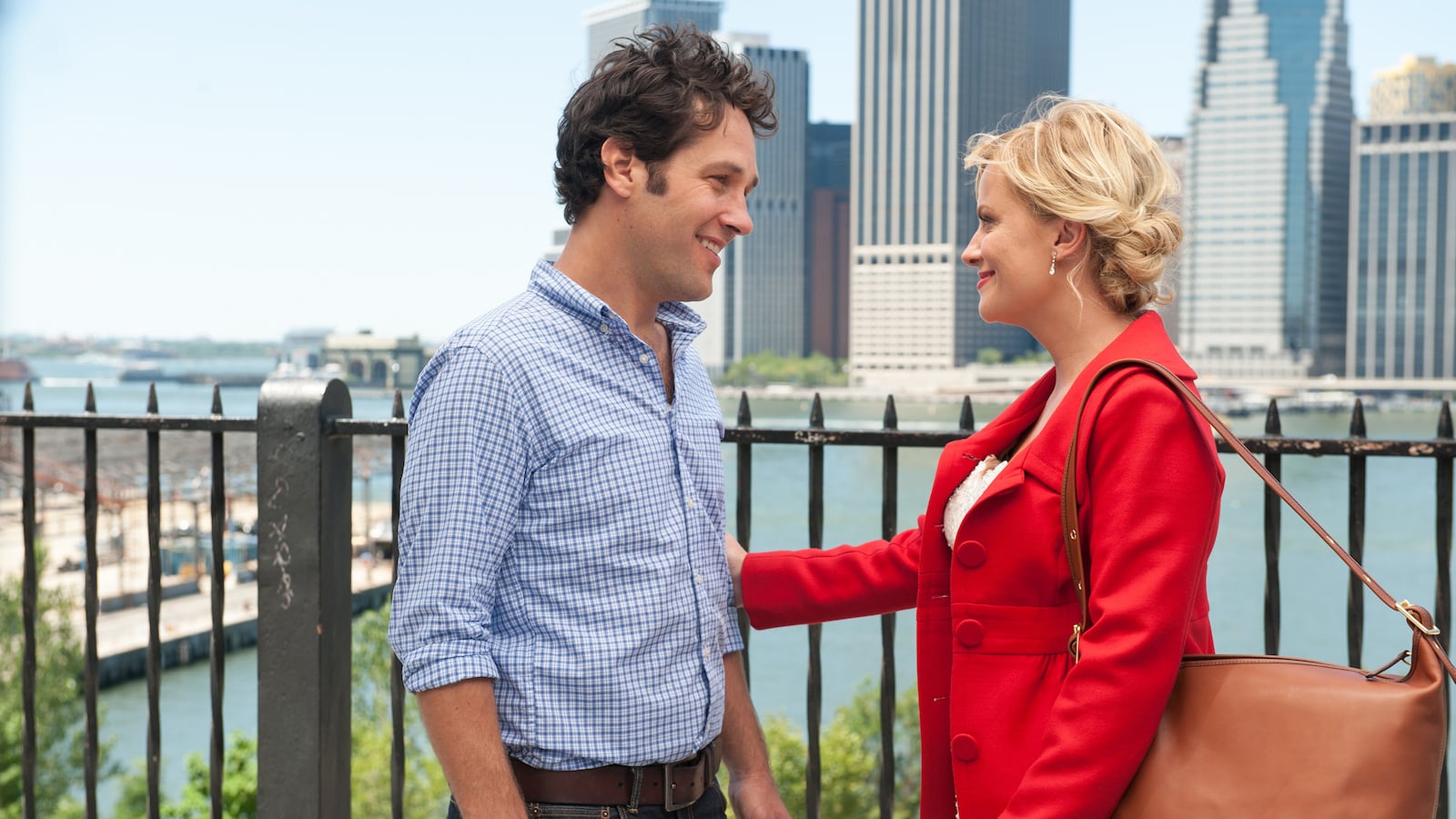They Came Together is a comedy. This much is clear. The movie stars Paul Rudd (I Love You, Man) and Amy Poehler (Parks and Recreation). It was co-written by Michael Showalter (The State). It was directed by David Wain (Wet Hot American Summer). These are some of the funniest people in the business. When you see it, you’re supposed to laugh.

And yet I left the theater the other day feeling sort of… sad.
The reason, I think, is that They Came Together isn’t just a comedy—it’s a parody of romantic comedies. Molly (Poehler) owns a quirky mom-and-pop candy shop on New York’s Upper West Side. Joel (Rudd) works at the big Corporate Candy Company that’s threatening to put Molly out of business. At first Molly and Joel hate each other—and then (surprise!) they fall in love.
If the story sounds familiar, that’s because it is; Wain & Co. borrowed it from You’ve Got Mail (which itself was a riff on the 1940 Jimmy Stewart classic The Shop Around the Corner). Many of their jokes refer to Nora Ephron’s canonical 1998 romcom as well. There’s Joel and Molly’s over-the-top obsession with New York, which everyone keeps reminding us is “almost like another character” in their tale. There’s the used bookstore where Joel and Molly finally discover they’re right for each other. There’s Joel and Molly’s sense of shared bemusement at the increasing intricacy of the modern coffee-industrial complex. And so on.
But You’ve Got Mail isn’t the only movie They Came Together strip-mines for satire. Basically the film is a compendium of every romcom cliché known to man, lovingly compiled, combined, and amplified to an absurd degree. Molly acting clumsy. Joel and his bros discussing lady problems while shooting hoops. Molly ordering food a very specific way. Molly and Joel playing Charades at a holiday party. A falling-in-love montage. A trying-on-clothes montage. “I’ll have what she’s having.” If you’re a fan of the romcom genre, watching all of these gags in quick succession is dizzying, delirious, and ultimately very funny.
It’s also strangely depressing. Here’s why: As They Came Together wore on, I started to realize that every movie it was referencing was at least 15 years old. That no one under the age of, say, 30 would have any clue what Rudd and Poehler were parodying.
And then it hit me: Could it be that the Romantic Comedy is dead—and that I didn’t notice until it was too late? How in the name of Meg Ryan did this happen?
I’m afraid the answer to the first question is yes. I should start by saying (in case you haven’t figured it out already) that I really like romantic comedies. Sure, they can be conventional. But pop songs tend to be conventional, too, and that doesn’t dull the dopamine rush of a perfect chorus. A well-made romcom—It Happened One Night, Sleepless in Seattle, Say Anything…, Groundhog Day, The Apartment—works in much the same way. It’s a dazzling machine doing exactly what it was designed to do.
The rub is that these devices have been in short supply lately. The last decent rom-coms came out in 2012: Silver Linings Playbook and The Five-Year Engagement. Since then, nothing. Here’s the list for 2013: Warm Bodies, I Give It a Year, Admission, Goddess, The Big Wedding, Don Jon, and One Small Hitch. The 2014 roster is even more pathetic: About Last Night, Lust for Love, And So It Goes, Sex Tape. Compare that to, say, 1998 (The Wedding Singer, You’ve Got Mail, There’s Something About Mary) or 1999 (10 Things I Hate About You, Notting Hill, She’s All That, Never Been Kissed). It’s not even close.
And it’s not just a decline in quality that we’ve been seeing in recent years; it’s a decline in quantity, too. By my (admittedly unscientific) count, Hollywood averaged 11 or 12 romantic comedies per year between 2001 and 2011. Since 2012, however, that average has fallen to seven or eight per year. The trend line is obvious. Earlier this year, BuzzFeed included 18 romcoms from the 1990s and 16 romcoms from the 2000s on its list of 58 Romantic Comedies You Need to See Before You Die. Only five from the 2010s made the cut.
Which brings us to our second question: Why is the Romantic Comedy becoming such an endangered species?
The reason, I think, is that our movie culture has been changing in ways that no longer favor the genre. I see five factors at work here.
The first—and most important, as usual—is Money. Since the turn of the century, the audience for mid-budget studio movies in general has dwindled. There are many explanations for this: the excellence of cable TV, which scratches a similar itch from the comfort of home; the proliferation of streaming video, which gives adult audiences yet another excuse not to pay $15 for a movie ticket; the dozens of other digital divertissements and distractions that now compete for our time.
As a result, Hollywood has reoriented itself toward metastasizing foreign markets like China and India—where translating an explosion makes more sense than translating a screenplay—and decided to put all of its chips on what the industry rags refer to as tentpole pictures: pricey comic-book spectacles, superhero reboots, and 3D IMAX sequels that can be marketed as “events” rather than mere movies. As Zachary Wigon has written, “You load up on potential tentpole projects, pour an enormous amount of money into all of them, and assume that the hits—and their forthcoming sequels and TV and DVD deals—will cover the losses from the misses, with enough money left over for a healthy profit.”
The second reason why romantic comedies have been suffering is Boys—both in the audience and behind the camera. Romcoms used to be known as “chick flicks,” and while the name isn’t entirely accurate (exhibit A: me), there’s something to it: Women tended to buy more tickets to these movies than men. But now that Hollywood has concluded that its only remaining competitive advantage is spectacle, it’s all but ceded the fairer sex to cable TV. The only demographic adrenalized enough to reliably show up for this weekend’s latest extravaganza is men aged 18-24, or so the thinking goes, and so the industry keeps churning out dude bait. Even romantic comedies themselves have become more male-centric over the last dozen years, with the Nora Ephrons and Nancy Meyerses of the world giving way to “bromance” auteurs such as Judd Apatow (The 40-Year Old Virgin) and Jason Segel (I Love You, Man).
Girls have something to do with this shift as well—again, on both sides of the camera. Take Mindy Kaling, who has made no secret of her love for romcoms. “What I’d really like to write is a romantic comedy,” Kaling revealed in The New Yorker in 2011. “This is my favorite kind of movie.” And yet Kaling hasn’t created a big-screen romantic comedy yet; she’s been too busy making a television show (The Mindy Project). Same goes for Tina Fey (30 Rock) and Lena Dunham (Girls), two other female writers who could potentially reinvigorate the genre (but who likely see more creative freedom in TV).
Meanwhile, appealing young actresses who could have been this generation’s Meg Ryans or Julia Robertses—actresses like Jennifer Lawrence, Emma Stone, and Scarlett Johansson—have read the writing on the wall and increasingly gravitated toward big tentpole jobs. Sometimes these parts suggest that we’re making progress; Lawrence’s Hunger Games franchise, for example, is probably the most female-centric blockbuster in recent memory. But often they’re little more than comic-book tokenism. Meg Ryan had more to do in When Harry Met Sally than, say, ScarJo in The Avengers.
The final reason romantic comedies have fallen on hard times is Branding. In part this is what I call The Matthew McConaughey Problem. From 2001 to 2011, McConaughey seemed like he was determined to destroy the genre singlehandedly by starring in a series of indifferent romcoms with indistinguishable titles such as Failure to Launch, Fool’s Gold, and Ghosts of Girlfriends Past. Actors learned what not do with their careers—Jennifer Lawrence didn’t want to end up like Kate Hudson, did she?—and audiences learned to stay away. The damage was incalculable. At the same time, lightness and charm became uncool; darkness and so-called “authenticity” took over. Why bother with a fizzy trifle like You’ve Got Mail when you can drink deeply of Batman Begins instead?
The problem, of course, is that it’s not an either/or decision. There was room for Bringing Up Baby in the 1930s. There was room for His Girl Friday in the 1940s. There was room for Roman Holiday in the 1950s and The Apartment in the 1960s and Annie Hall in the 1970s and Roxanne in the 1980s and My Best Friend’s Wedding in the 1990s and High Fidelity in the 2000s—just like there’s still room for sparkling romantic comedies today.
For fans like me, there are some signs of hope. Jason Segel is good at what he does. Mindy Kaling has written a “classic romantic comedy.” And maybe Lena Dunham will step up one day.
Still, I couldn’t help but wish—as much as I laughed at its nostalgic, absurdist humor—that They Came Together wasn’t a parody at all. An old-fashioned romcom starring Paul Rudd and Amy Poehler? Now that’s something I would pay to see.





